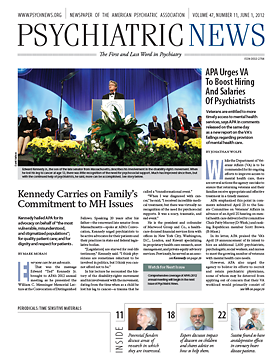In late February, the Centers for Medicare and Medicaid Services (CMS) issued a proposed rule governing the second stage of the Electronic Health Record (EHR) Incentive Program, which offers Medicare payment bonuses to physicians and hospitals that adopt certified EHR systems and demonstrate “meaningful use” of the new technology.
As in the first stage of the program, which began in 2011, CMS is proposing that meaningful use be defined as fulfilling (or qualifying for an exclusion to) a specific set of “core” and “menu” measures. Eligible physicians and hospitals would also be required to report on 12 clinical quality measures (CQMs) to qualify for incentive payments under the program.
APA submitted comments on the agency’s proposal on May 7, commending CMS for its efforts to make the EHR Incentive Program more relevant to specialists through a number of additions and adjustments, but voiced concern that many of the 17 core measures proposed by CMS still cannot be satisfied by most psychiatrists, including several that could compromise the psychiatrist-patient relationship.
One such measure would require physicians to provide more than 50 percent of patients with electronic access to their health information while at the same time ensuring that this information is viewed, downloaded, or transmitted to a third party by more than 10 percent of patients.
“As a general principle, a physician’s performance of core measures should not be dependent upon actions being taken by the physician’s patients,” wrote APA Medical Director James H. Scully Jr., M.D. “This principle rings particularly true for psychiatrists whose successful treatment of a patient is largely dependent upon having the trust of their patients.”
On similar grounds, APA recommended that CMS remove a core measure that would require 10 percent of a physician’s patients to send a secure message via the electronic messaging function of a certified EHR system.
APA also took issue with CMS’s modification of a Stage 1 meaningful-use core measure that required physicians to provide clinical summaries for more than 50 percent of all office visits within three business days. As proposed for Stage 2 of the program, physicians would have only 24 hours to provide a clinical summary—an amount of time APA deems insufficient “to make an informed decision as to what information should or should not be shared with the patient.”
In assessing the five menu measures proposed by CMS, at least three of which would also have to be met to qualify for incentive payments, APA commended the agency for devising a sufficient number of exclusions that are broad enough to be satisfied by psychiatrists.
APA also praised CMS for adding to its list of reportable CQMs several measures that are specifically relevant to the treatment of mental illness.
Additionally, APA voiced strong support for CMS’s proposal to delay the implementation of the onset of Stage 2 meaningful-use criteria from 2013 to 2014.
However, APA expressed equally strong opposition to the proposed back-dating of payment adjustments for physicians participating in Stage 2 of the EHR Incentive Program, maintaining that such a move would “subject numerous physicians to financial penalties and slow down EHR adoption and implementation.”
APA also questioned the amount of time that CMS predicts will be required by physicians and hospitals to fulfill the proposed Stage 2 meaningful-use measures, calling the agency’s minimum burden estimate of 10 hours, 15 minutes “too low.”
Similarly, APA predicted that physicians and hospitals will be required to “expend an enormous amount of financial resources” to fulfill the proposed Stage 2 meaningful-use measures.
“Much of the legislative intent of health reform has been to facilitate physicians’ ability to deliver more efficient, cost-effective, and coordinated care to Medicare beneficiaries,” Scully wrote. “With a growing shortage of psychiatrists currently available to all Americans, we cannot afford to further restrict Medicare beneficiaries’ access to psychiatrists.”

